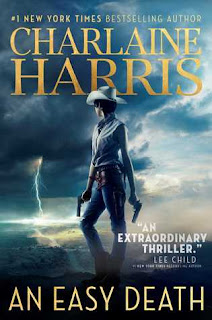3/5 stars on Goodreads
 |
| The Best Thing You Can Steal by Simon R. Green |
The Best Thing You Can Steal is the first book in Gideon Sable UF series by Simon R. Green, a British fantasy author of several series and dozens of books. I received a free copy from NetGalley in exchange for an honest review.
The book takes place in modern London that is full of supernatural and paranormal in ways that isn’t really explained. They simply are. The sole point of view character is Gideon Sable, a thief and con-artist wearing someone else’s face, who’s about to pull the heist of his life to take down an evil collector of rare magical items. He’s accompanied by his ex-girlfriend Annie Anybody, a woman who can charm technology; the Damned, a man who’s killed angels; Johnny Wild Card who knows what reality truly is, and the Ghost who’s been haunting the streets of London for decades. They’ve all been wronged by the collector and have their reason to want revenge.
For a heist book, this was incredibly dull. There was no excitement, no unexpected twists. Deus ex machinas don’t count, even literal ones. For any kind of book, it was really oddly composed, and not what I’d expect from a seasoned author. Nothing happens. There’s no plot, only a series of events that go from A to Z in preordained order, with odd sideways jumps that don’t affect the story or the behaviour of the characters in any way.
Over half of the book is taken by character introductions. Gideon goes to them one by one, asks them to participate in the heist, they say yes, and then tell him their life stories. Then we learn what the heist is about, meet one more character who has no role to play in the story, do a detour to an event that doesn’t affect the plot in any way, go through the heist plans one more time, and then follow the plans step by step with no surprises.
There were no antagonist forces putting obstacles in the characters’ path (armed guards don’t count), and the characters didn’t get in their own way either. A brief surprise was had when the goal of the heist wasn’t quite what they’d thought, there was some moralising about it, and then we learned what the best thing you can steal really is. Which was just. So. Lame. It’s really not worth reading the book for that.
The characters were a combination of quirky and tragic, though not quite as quirky or tragic as the author probably intended. They also changed pretty fast when interacting with the others. Unlike the rest, Annie Anybody wasn’t given a backstory. She could be anyone she wanted, but I expected at least some sort of insight into her. Was she born that way? Where did her skill with the machines come from?
But the oddest character was Gideon Sable himself. We don’t learn anything about him, even though he’s the first person narrator. We know he’s not who he used to be, but just because he has assumed another person’s face and identity shouldn’t mean the reader isn’t given any insight into who he was before or why the change, or how it was possible. We don’t know his age, or if it changed when he assumed Gideon Sable’s life, and we don’t learn why he’s after the collector. Some mystery is expected to keep the reader’s interest, but since we view the events through his eyes, not having a clue of what he thinks or feels, or what motivates him is really bizarre.
The best thing you can say about the book is that it’s short. The language is descriptive and there’s a lot of it; by the time you finish a sentence you’ve forgotten what it’s about. A lot of effort has been put into creating the weirdest possible items, people, and events, and most of the book is taken by describing these. Therefore, it’s slightly odd that I constantly had a feeling that everything took place in a bubble. Nothing connected to anything, smelled or felt like anything. For all that every chapter began with a description of London, I never felt like I was there.
The book has a conclusive ending. If this is a part of a series, it doesn’t really set the stage for follow-ups. Maybe it doesn’t have to go farther than this. There’s certainly nothing compelling this reader to continue.







